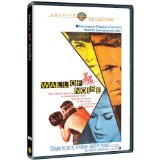| Reviews & Columns |
|
Reviews DVD TV on DVD Blu-ray 4K UHD International DVDs In Theaters Reviews by Studio Video Games Features Collector Series DVDs Easter Egg Database Interviews DVD Talk Radio Feature Articles Columns Anime Talk DVD Savant Horror DVDs The M.O.D. Squad Art House HD Talk Silent DVD
|
DVD Talk Forum |
|
|
| Resources |
|
DVD Price Search Customer Service #'s RCE Info Links |
|
Columns
|
|
|
Wall of Noise (Warner Archive Collection)
"What do you want?"
"Everything! Now!"
Not bad-at-all romantic melodrama, set at the famed Hollywood Park racetrack (where ironically, the horses don't run anymore). Warner Bros.' Archive Collection line of hard-to-find library and cult titles has released Wall of Noise, the relatively obscure 1963 drama from Warners about the grittier side of horse racing--and screwing around on the side--starring Suzanne Pleshette, Ty Hardin, Dorothy Provine, Jimmy Murphy, Ralph Meeker, Simon Oakland, and Murray Matheson. Based on a book by Daniel Michael Stein, Wall of Noise has an agreeably hard-nosed tone (at least by 1963 mainstream studio standards), while giving us a decidedly unglamorous behind-the-scenes look at the cutthroat business of horse racing. No extras for this nice black and white anamorphically enhanced widescreen transfer.
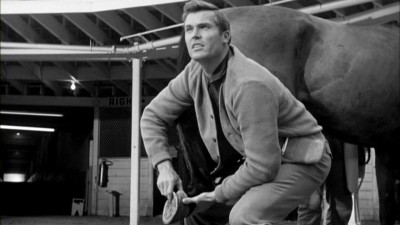
"Gypsy" horse trainer and owner Joel Tarrant (Ty Hardin) is putting everything on the line when his own horse, Frank's Choice, is to run in a big race at Hollywood Park. Tired of moving around, working for others, while he has to make do with less-than-top colts, Tarrant sees a chance in Frank's Choice that he may not have again: access to the "Winner's Circle," and subsequently breaking through to the big leagues. Helping him out are successful-but-erratic jockey Bud Kelsey (Jimmy Murphy), whom Tarrant weaned off the bottle, and Tarrant's live-in girlfriend, Ann Conroy (Dorothy Provine), a beautiful lingerie model for whom Bud has always held a torch. Even Ann's gruff-but-kindly boss, Johnny Papadakis (Simon Oakland), believes in Tarrant; he's willing to lay down four yards on Frank's Choice, just on Tarrant's say-so. But everything goes wrong when principled Tarrant--who hates most of the owners and trainers who carelessly burn-out and destroy horses strictly to win races--excuses the horse on the day of the race, when he believes Frank's Choice is suffering a minor-yet-potentially-ruinous leg fracture. Worse, he discovers that Ann didn't bet their combined savings on Frank's Choice--a betrayal of faith in his dream and his skills that all-or-nothing Tarrant can't abide, when he subsequently kicks Ann out. Bud steps in and takes Ann to Florida--all above board, he claims--while Tarrant is pursued first by crude, crass, wealthy construction company owner Matt Rubio (Ralph Meeker), who's hungry to buy some "class" in the "Winner's Circle," with Tarrant as his stable-builder, and second by Laura Rubio (Suzanne Pleshette), Matt's wife, who's had enough of Matt's destructive manipulation. When Laura has Tarrant buy wild stud stallion Escadero, the emotional and sexual paybacks for all concerned begin...with a vengeance.
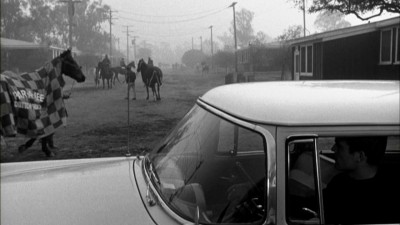
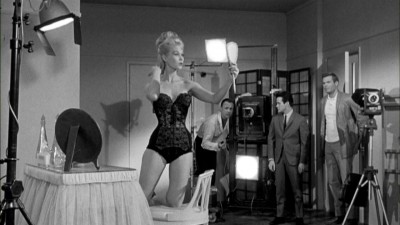
I'm not sure I ever heard of Wall of Noise, prior to it showing up in my screener list. Once I saw who made and it when, and who its stars were, I expected a typically glossy Warner Bros. effort from the early 60s (promising a bit more in terms of adult themes than could be found on more-popular television at the time), when Warners and the other major studios were trying to figure out how to stem the continued fall-off in returns for their once-successful formula genre pictures. Those superficially flashy titles from that time period are usually written off today by reviewers and historians as lame stop-gaps from the conservative studios who at the time still, by and large, stubbornly refused to truly let movies "mature," if you will--a distressingly popular but dubious elitist theory, anyway, that relegates a lot of worthwhile, entertaining movies into the historical junk pile. In Warners' case, I always suspected the studio's deliberate use of their television contract stars in these big-screen efforts weighted many critical opinions against these outings, which only served to point out the reviewers' snobbery towards the popular medium. Just from an economic standpoint, it only made sense for Warners to do this with their lower-budgeted movies (particularly when the box office was in such a slump at that time): just as they were the first major studio to successfully break into television production by cannibalizing their backlog of feature films, why not then make inexpensive movies with the new TV stars and contract players they created, for TV fans looking for something a little more adult and risque than they could get on the tube?
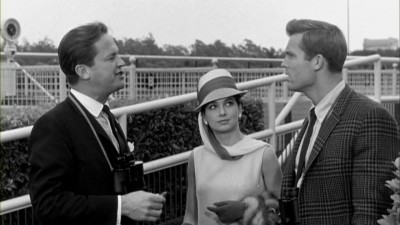
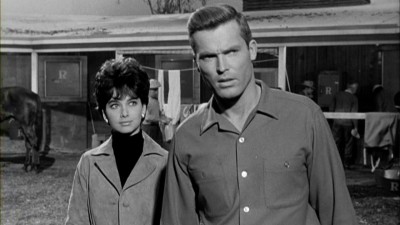
Now, had late-career Delmer Daves made Wall of Noise (which I wouldn't have minded, either), the glitz and glamour of the location work would have been ramped up considerably (and in saturated color, no doubt), while the hearts and flowers aspect of the central romantic triangles would have been inflated (to please all the teenyboppers and housewives catching this at the drive-ins or afternoon matinees). Here, though, director Richard Wilson (1959's Al Capone, Invitation to a Gunfighter, Three in the Attic, the Welles documentary, It's All True) eschews the sparkly mystique we expect to encounter in such an outing, opting instead for a relatively low-key, believable, decidedly more matter-of-fact look at the goings-on at a high-stakes race track. When Wall of Noise shows us these heretofore unknown doings at the speed track, it's fascinating like any movie that clues us into a world we've never seen before (not only is strategy often discussed--when to race a horse, the factors that contribute to a winner and loser--but Hardin often physically examines his animals, letting us know what's going on with them in terms of their ability). And not surprisingly, it's a pretty crappy world back behind the stables, where horses are merely vehicles for personal vanity and venality, as well as pawns in power games between professional rivals and scrapping romantic partners.
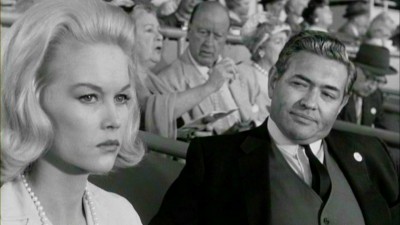
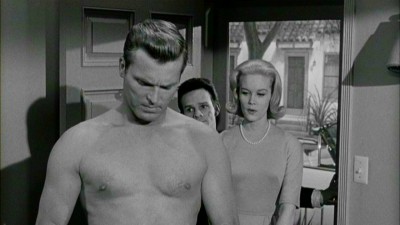
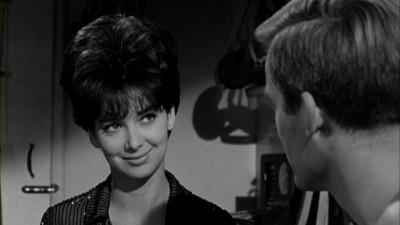
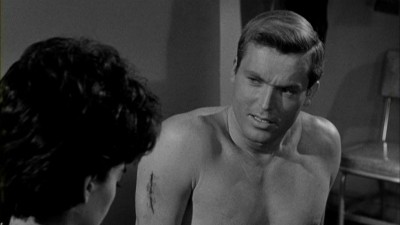
I wish the director, Richard Wilson (apparently an acolyte of Orson Welles, no less), had been a little more adept with the promising material here; his mise-en-scene is pretty much devoid of any meaning, and his TV-like reliance on close-ups ruins crude but at least potentially interesting exchanges, such at Hardin's and Pleshette's first meeting, where suggestive notions of "breeding" versus "performance" are bandied about...to no appreciable effect (perhaps it was the result of budgetary constraints; few cinematographers could best Lucien Ballard at the time, but this has to be one of his least-impressive showings, with flat television lighting and boring frames). Still, it's a workmanlike job that doesn't get in the way of the story's downbeat tone (Daves would have made that racetrack world a lot richer, a lot more showily "dramatic," and a lot more vicariously sensuous...which would have seriously undercut the story). As for those "TV actors" and other B-level stars--they're just fine here. Ralph Meeker, always best when playing a sleaze, is memorably repulsive as a vicious bully ("Whip him! Whip him! Whip him!" he yells at his own failing horse) who greasily grins, "Turning a pig into a gentleman is supposed to be your job," to a clearly disgusted Pleshette. Provine, critically, is missing for a big middle section of the movie (a mistake in story construction that robs some dramatic tension from the movie's final act), but when she's on, she's quirkily successful (and a lu-lu in slutty lingerie). Pleshette, criminally underrated at this point in her career (before she was enshrined in TV history with her sexy-but-safe "good wife" role in The Bob Newhart Show), turns out her usual smoky, smoldering, sexually frustrated housewife role with skill, while the biggest surprise here turns out to be Ty Hardin. I haven't seen enough of Hardin to be able to claim what kind of actor he was, but here, in limited ways, he's used quite effectively, with a square-jawed, steely-eyed single-mindedness in his pursuit of the "Winner's Circle" that works within Wall of Noise's aesthetic framework. You buy his trajectory from principled-but-ruthless two-bit trainer, to "kept" society trainer and lover, to broken, remorseful sell-out. It's not a "great" performance...but it's a good one, in a better-than-expected meller.
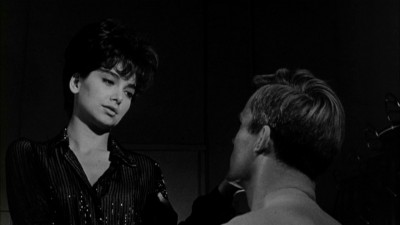
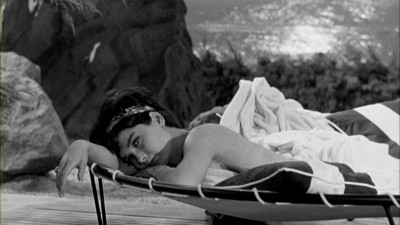
The Video:
The anamorphically-enhanced, 1.78:1 framing looks a little tight at times, but it's hard to say if this is post (wouldn't it have been projected at 1.85?), or just the way it was shot (it almost looks as if it was prepared specifically to be shown on TV at some point--not all that uncommon then...or now). Otherwise, the image is sharp, with decent blacks and moderate grain.
The Audio:
The Dolby Digital English mono audio track is fine, with little hiss. No subtitles or closed-captions.
The Extras:
No extras for Wall of Noise.
Final Thoughts:
Straightforward, unpretentious horse track melodrama. Wall of Noise gives us a look at the race track that most of us probably haven't seen before, while presenting a downbeat worldview that says everyone but everyone uses and gets used. Amen to that. A nice surprise, with solid performances. I'm recommending Wall of Noise.
Paul Mavis is an internationally published movie and television historian, a member of the Online Film Critics Society, and the author of The Espionage Filmography.


|
| Popular Reviews |
| Sponsored Links |
|
|
| Sponsored Links |
|
|
| Release List | Reviews | Shop | Newsletter | Forum | DVD Giveaways | Blu-Ray | Advertise |
|
Copyright 2024 DVDTalk.com All Rights Reserved. Legal Info, Privacy Policy, Terms of Use,
Manage Preferences,
Your Privacy Choices | |||||||









